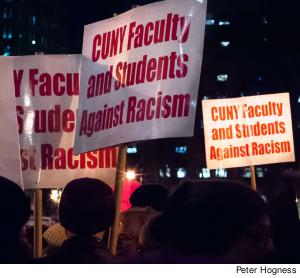At least three different police departments in New York City have turned their cameras and undercover officers on leaders and members of the Black Lives Matters (BLM) movement. The Metropolitan Transit Authority (MTA) and Metro-North Railroad police forces worked in coordination with intelligence officers at the New York City Police Department to photograph and profile participants in BLM protests in Grand Central Terminal and elsewhere, reports the news website The Intercept.
 |
The surveillance appears to be in violation of a long-standing consent decree on the limits of information that police in the city are permitted to collect on members of dissident and protest movements.
Perhaps that is why the police documents revealed by The Intercept frame the spying on BLM activists as “counterterrorism” efforts – despite the fact that BLM protests have been peaceful, a fact police concede in their own accounts of movement activities. CUNY faculty and staff have been among the leading voices critical of the surveillance.
Divide and Conquer
“I think there’s a two-pronged approach to this that is both racialized and intended to discourage any further criticism of the police,” Delores Jones-Brown, professor of law, police science and criminal justice at John Jay College, told Clarion. “There’s a notion [within law enforcement] that if we lump these [dissident] brown people… with the brown people who are international terrorists, then we can divide and conquer, or at least block the kind of solidarity … that I saw in some of the demonstrations that I’ve participated in against police.”
Local Black Lives Matter leaders launched a series of large protests in response to the police killing of Eric Garner of Staten Island. Garner, an unarmed African-American man, died on July 17, 2014, when Officer Daniel Panteleo, who is white, applied a chokehold to Garner’s throat. The PSC put out a call to members to participate in the We Will Not Go Back March, prompted by Garner’s death, that took place on Staten Island the following month, and PSC members continue to take part in BLM activities.
The actions of the police forces involved appear to violate the Handschu agreement, a 1985 consent decree that resulted from a case launched by attorney Barbara Handschu and members of dissident groups. The groups claimed a violation of their First Amendment rights after a 1971 case against members of the Black Panther Party revealed widespread police surveillance on antiwar and racial justice groups by New York City police. The ruling limited the NYPD’s spying activities to organizations and individuals whom the department had reason to suspect of criminal activity.
Then in 2003, CUNY Law professor Steve Zeidman told WNYC reporter Soterios Johnson, the police department went to court to argue that the agreement should be vacated for the purpose of monitoring potential terrorists in the wake of the 2001 September 11 attacks. While the court did not grant the request in its entirety, it did dilute the agreement with language that leaves it open to interpretation.
“The NYPD pretty much seized upon the fear and anxiety, post 9/11, to remove or to relax the Handschu guidelines,” Zeidman told WNYC. Where before the police had to prove that they had specific information that a criminal act was about to take place before they could surveil or infiltrate dissident groups, the 2003 ruling allows police to spy for “a ‘reasonable indication’ that a crime was about to or might occur,” Zeidman said. “[It’s a] much more relaxed standard that opened the door for this kind of monitoring.”
The documents published by The Intercept, obtained through a Freedom of Information Law request filed by activists, cover the period from December 2014 to February 2015, with a focus on the People’s Monday protests at Grand Central, the Midtown train station for Metro-North that sits atop major stops for several MTA subway lines. (The protests take place each week at varying locations throughout the city.)
“Historically, law enforcement, both local and national, have a track record of keeping files on activists, engaging in surveillance, and targeting for excessive enforcement action people identified in leadership roles in social movement,” Alex Vitale, associate professor of sociology at Brooklyn College, told The Intercept.
No Coincidence
The fact that the Handschu agreement grew out of police spying on one movement for racial justice, and is now being defied to spy on another racial justice movement is not a simple coincidence, according to Jones-Brown, who is the founding director of John Jay’s Center on Race, Crime and Justice.
“Unfortunately, with the notion of surveilling the Black Lives Matter movement, we get a modern-day, new-millennium manifestation of the racial legacy that America has never fully admitted to [or] attempted to address,” Jones-Brown told Clarion.
“But it’s not new,” she explained. “The same thing happened during the civil rights movement of the 60s, where the folks who were most active in trying to get civil rights for African Americans were spied on and presented as these horrible people.”
Paul Washington, a HEO at Medgar Evers and a longtime civil rights activist agrees, adding: “What the state fails to comprehend is that BLM is a protracted source of resistance. Just as in the 60s and 70s, it is not just a moment in history but a movement.”
“I think most people would agree that there’s precious little information and any sort of intel that anybody can point to as a result of all these efforts,” Zeidman explained to WNYC’s Johnson. “What’s the gain? The cost is very real. People are afraid to exercise First Amendment rights; it chills free speech. It’s essentially a scare tactic.”

